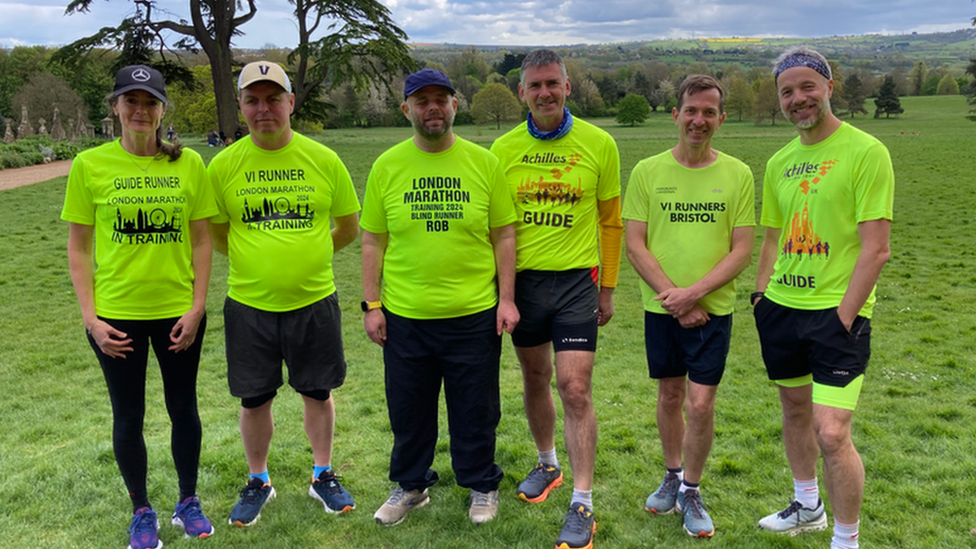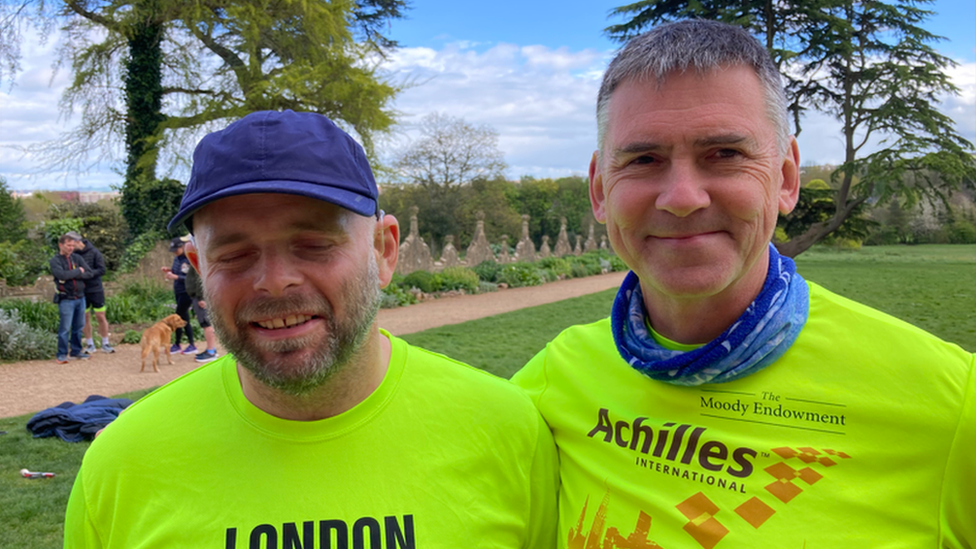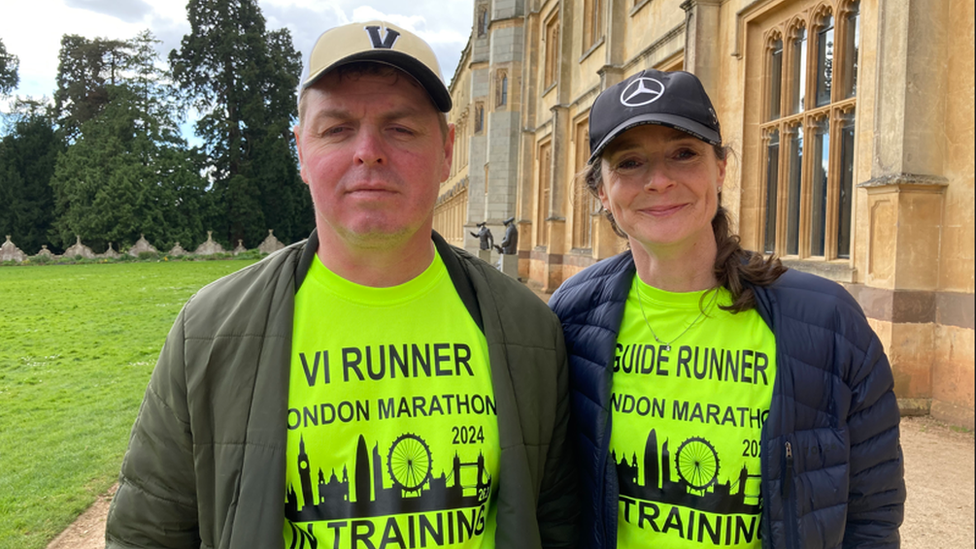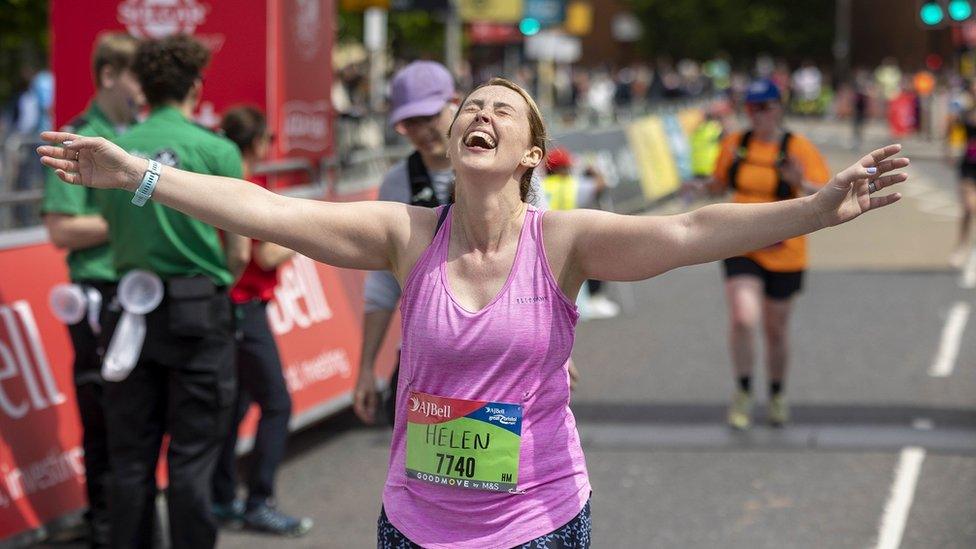London Marathon: Visually impaired runners share their ups and downs
- Published

The partially sighted runners and their guides say they are keen to tackle the 2024 London Marathon
Three visually impaired runners are planning to take on the London Marathon for their first time on Sunday.
The members of the VI Runners Bristol group have been training for the prestigious 26.2 mile (42.2km) race alongside their running guides.
They said their main goal was to get round and cross the finish line.
Runner Rob Rennell said while he was nervous: "It's a case of getting up there and learning from experience, like I've done with everything else."

The London Marathon will be crowded and noisy, but Rob Rennell says he is "determined" to cross the finish line with his guide Colin Johnson
The 41year-old from Cheltenham, Gloucestershire has a rare optic nerve condition and became partially sighted 10 years ago.
He also has profound hearing loss in his right ear, which makes running with thousands of others extra challenging.
"I am excited but slightly tense and overwhelmed because it's my first time," he said.
"There's been a few wobbles, but I've been very committed and determined. For someone with sensory impairment it's gone really well," he added.
He said his goal was "just to get across the finish line with Colin and give 100% for the people who've given me their time".
Mr Rennell's guide Colin Johnson, 59 is an experienced marathon runner, but said London was one of the most challenging marathons to run as a guide.
Last year 48,000 people finished the London Marathon.
Mr Johnson said: "It's very busy, very crowded and very noisy.
"You've got to be prepared to shout at other people to move out the way, to give us more space."
Fellow runner Justin Tago said it was "a once in a lifetime opportunity" and he was "super-thrilled" to have a place.
Visually impaired runners are paired with sighted running guides. They are linked with a hand-to-hand tether and learn to judge pace and fitness over time by training with their guides.

Justin Tago and guide runner Joe Spurgeon say they use a simple method of verbal communication with keywords to help them run side by side
Mr Tago, 54, from Bristol has been running for a year and completed a 10K run at the Great Bristol Run.
"I've always loved physical activity but with a sight impairment it's quite difficult to have access to exercise like running."
Mr Tago has lifelong tunnel vision so has no peripheral sight.
He described running as "experiencing the world on my terms", with the help of his guide.
"I can engage with the surroundings completely freely, yet safely, which I wouldn't be able to do on my own."
His running guide Joe Spurgeon said: "We've had a few accidents on the way. But we've got our language down with certain key words. It seems to work."
Running the London Marathon was a different proposition though, he said.
"It's hours and hours, so it's all about concentrating and keeping focused for a long time.
"Normally it's just me, Justin and a few dog walkers, so it's going to be something different," Mr Spurgeon added.
"I'm really looking forward to it," said Mr Tago.
"It's a once in a lifetime opportunity for me and I'm super thrilled to have a place and be running with Joe."
The goal is to complete the course in "single figure hours".

Marly Brundell ad Vicki Pike are both attempting the London Marathon for their first time on Sunday
Marly Brudenell, 44, from Frome in Somerset began his running journey two years ago.
He started losing his periphery vision due to a genetic condition a year before that.
It was after doing a successful 5K run with his guide Vicki Pike, 52, that they decided to tackle a marathon, a first for both of them.
"It'll be amazing and be more of the amazing journey we've been on," he said.
He said thinking about his children gave him the motivation to keep running and he said he cannot wait for Sunday.
Like his running group friends, Mr Brudenell said his goal was simply "to get to the end".

Follow BBC Bristol on Facebook, external, X, external and Instagram, external. Send your story ideas to us on email, external or via WhatsApp on 0800 313 4630, external.
- Published16 April 2024
- Published15 May 2023
